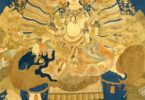《百喻经》
[The] Sūtra [Of A] Hundred Parables
(四六)偷牦牛喻
(46) Parable [Of] Stealing [The] Yak
譬如一村共偷牦牛而共食之。
For example, [there were people from a] village [who] together stole [a] yak and together ate it.
其失牛者逐迹至村,唤此村人问其由状,而语之言:「尔在此村不?」
That [person who] lost [the] yak followed [the] footprints [and] arrived [at the] village. Calling this village’s people, [he] asked them [about their] reasons [and] situation. [He] then spoke [to] them, saying, ‘[Do] you [live] in this village [or] not?’
偷者对曰:「我实无村。」
Those [who] stole replied, ‘We truly [have] no village.’
又问:「尔村中有池,在此池边共食牛不?」
Again asking, ‘This village within has [a] pond. [Did you] at this pondside together eat [the] yak [or] not?’
答言:「无池。」
[In] reply, saying, ‘[There is] no pond.’
又问:「池傍有树不?」
Again asking, ‘[Does this] pondside have [a] tree [or] not?’
对言:「无树。」
[To] answer, saying, ‘There [is] no tree.’
又问:「偷牛之时在尔村东不?」
Again asking, ‘[At the] time of stealing [the] yak, [were] you at [the] village’s East [or] not?’
对曰:「无东。」
[In] reply, ‘[There is] no East.’
又问:「当尔偷牛非日中时耶?」
Again asking, ‘When you stole [the] yak, [was it] not at noon?’
对曰:「无中。」
[In] reply, ‘[There is] no noon.’
又问:「纵可无村及以无树,何有天下无东无时?知尔妄语都不可信,尔偷牛食不?」
Again asking, ‘Even if [there] may [be] no village and no tree, how can [the] heavens below [have] no East and no time? Knowing you [are with] false speech, [that] all cannot [be] believed, [did] you steal [my] yak [and] eat [it or] not?’
对言:「实食。」
[To] answer, saying, ‘[We] truly ate [it].’
破戒之人亦复如是,覆藏罪过不肯发露,死入地狱,诸天善神以天眼观不得覆藏,如彼食牛不得欺拒。
Of people [who] break precepts, [they are] likewise thus, covering to hide [their] transgressions, not willing [to] reveal [them, after] death entering [the] hells. [As] all heavenly good gods, [are] with [the] heavenly eye looking, [they] cannot cover [to] hide [them], like those eating [the] yak, [this] cannot [be] deceived [and] denied.
[Note 1: Those who break the Fourth Precept (第四戒) by having false speech (妄语) are dangerous to themselves and others because they can simply lie to cover up for many other precepts broken, thus further harming one and all.]
[Note 2: Habitual and unrepentant liars will eventually unwittingly reveal the truth that they were lying all along, as the more lies they tell to cover earlier lies, the more difficult it becomes to conceal them, with every lie being a weakness, before the whole network of lies unravels. This contrasts with truths being ‘strong’ as they will always endure, even if they are yet to be discovered and stand alone.]
[Note 3: Even if some lies seem to go undetected until the end of this life, the unrelenting law of karma will ensure there are consequences of suffering accordingly, even in the manner of dying and in future lives.]
Namo Amituofo : Translation and notes by Shen Shi’an
上个喻
Previous Parable:
奴守门喻
[45] The Parable Of The Servant Guarding The Door
https://purelanders.com/2023/09/08/45-the-parable-of-the-servant-guarding-the-door-from-the-sutra-of-a-hundred-parables
下个喻
Next Parable:
贫人作鸳鸯鸣喻
[47] The Parable Of The Poor Person Making A Mandarin Duck’s Chirp
https://purelanders.com/2023/09/09/47-the-parable-of-the-poor-person-making-a-mandarin-ducks-chirp-from-the-sutra-of-a-hundred-parables
全百喻
All Hundred Parables:
https://purelanders.com/baiyu





